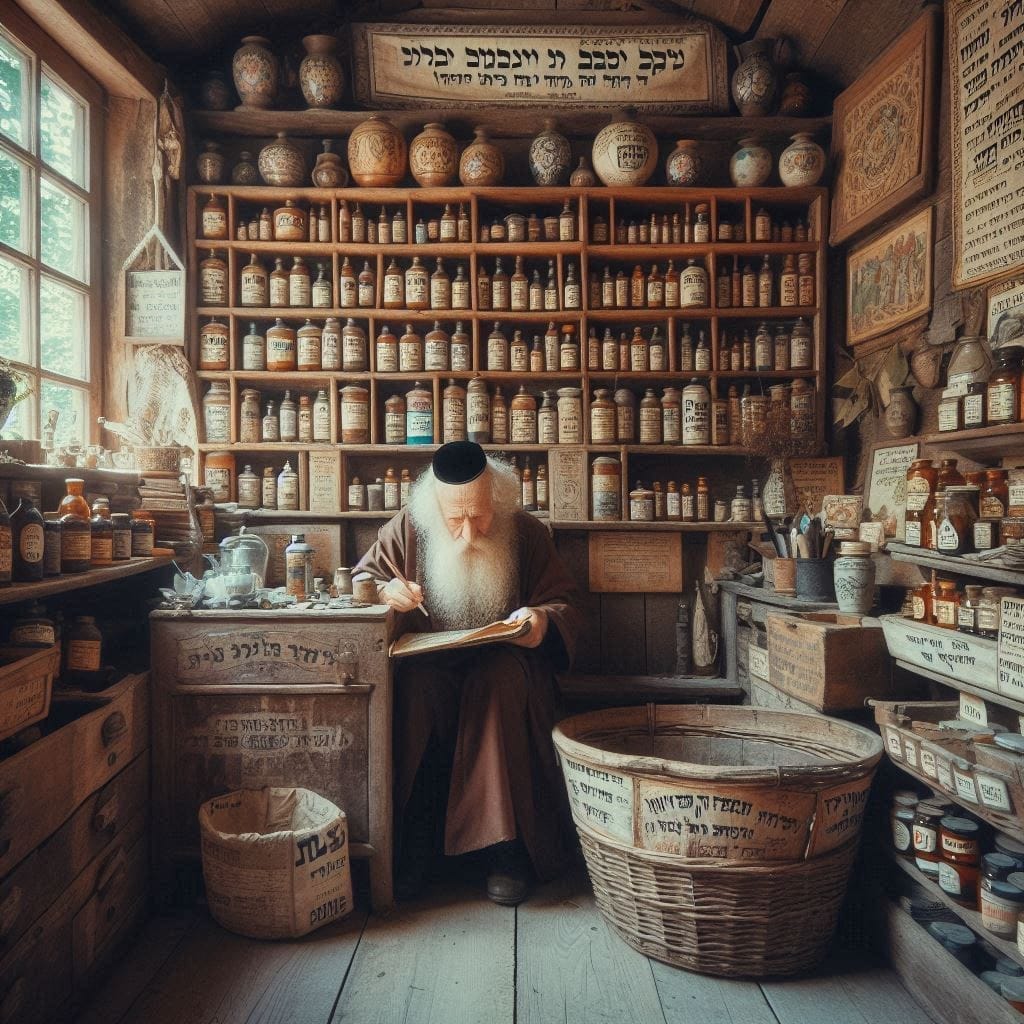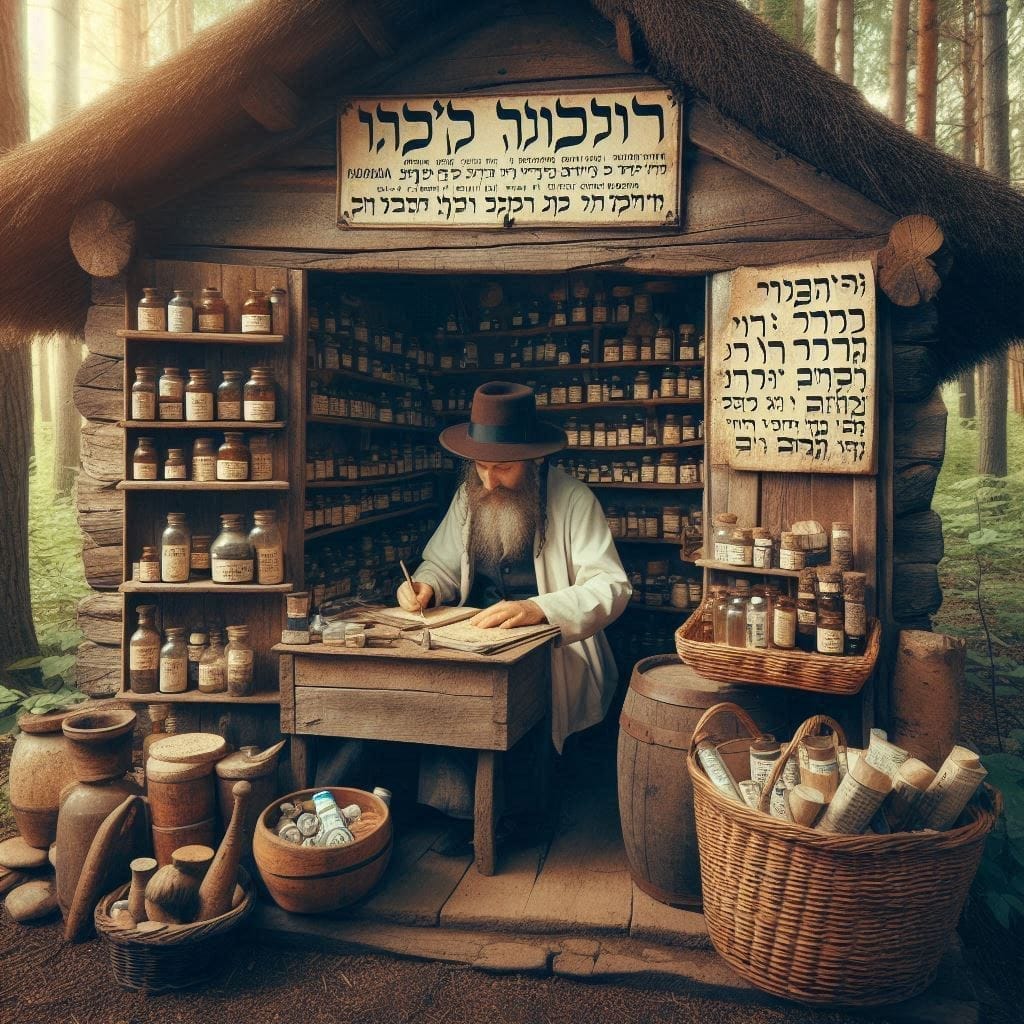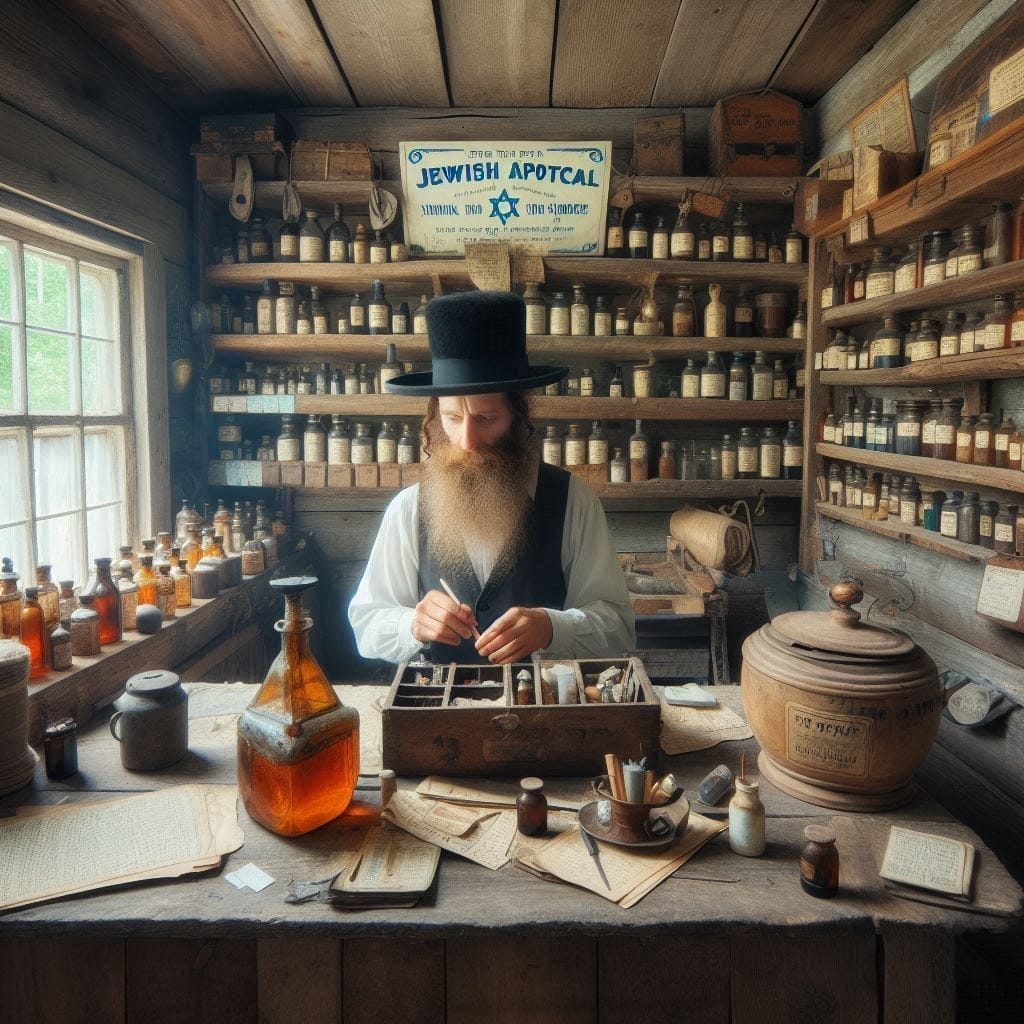
From Apothecary to Pharmakeia: A Torah-Based Framework on Healing, Medicine, and Deception
B"H
Full Disclaimer
This lecture is not intended to replace medical advice or scientific consultation. It is a Torah-based spiritual framework for discerning between holy healing and spiritual deception, as found and inspired in the writings of Halacha, the Talmud, Halakhic Midrashim and above all The Torah.
At the same time, we recognize that this is a very sensitive subject. We have lost people — friends, family, elders, young ones — to illness, complications, or difficult decisions around treatment. This message is not meant to dishonor anyone’s life or death. It does not speak lightly of what anyone has gone through.
In America, we have the freedom to believe, to research, to act — as long as we do not harm others. This teaching respects that freedom and urges compassion and humility in all such conversations.
There are truths on both sides:
• Yes, there are legitimate concerns about aspects of the medical system, especially where vaccinations, coercion, or scare tactics have been used to pressure or mislead.
• And yes, some people truly need medications — for blood pressure, diabetes, or inherited conditions — that are not the result of personal failure or lifestyle, but simply part of the natural rhythms of human life.
In Kabbalah, illness originates from the sin of Adam and Chavah eating from the Tree of Knowledge of Good and Evil, which caused a rupture in creation and introduced the mingling of good and evil into the human body and soul. This act concealed divine light and disrupted the harmony between the upper and lower worlds, leading to the entry of spiritual impurity (tumah) and the imbalance between soul and flesh. Illness is both physical and spiritual — it is a manifestation of this spiritual distortion, a symptom of the world’s disconnection from its Source, awaiting tikkun (rectification).
This teaching is not a blanket condemnation or endorsement of medicine. It is a call to return to honest, spiritually aligned healing, to ask, What would Hashem want? What preserves life, truth, and holiness?
The Answer is:
Whatever allows you to fulfill your purpose in this world.
If HaShem is guiding you to use medication so that you can have the strength to study Torah, teach Torah, raise your children in holiness, or simply walk in joy — then you should take it, and bless Him for this temporary or full healing.
But if HaShem is showing you that a certain medicine would cloud your clarity, dim your spirit, or distance you from your purpose — then with trust in Him, choose a different path, and He will provide strength, healing, and wisdom through other means.
The key is not whether a pill is “good” or “bad” — the key is emunah, discernment, and walking with Hashem, not with fear or rebellion, but with a heart tuned to His will.
Most importantly: This message is not to tarnish the memory of those we’ve have all lost, whether they chose treatment or not. It is to help us, the living, walk forward with clarity, conviction, and compassion, guided by Torah.

Introduction: Healing at a Crossroads
In our generation, perhaps more than any before, we find ourselves standing at a moral and spiritual crossroads. On one side, we have the noble pursuit of medicine, the desire to heal, to ease pain, to prolong life. On the other, we witness the widespread use of pharmaceuticals in ways that enslave, deceive, or manipulate. The line between healing and control has become blurred.
To walk this narrow bridge with wisdom, we must return to Torah. We must draw from the deepest wells of our tradition — from the Rishonim, to the halakhic midrashim of the Sifra and Sifri, the Tosefta, the Yerushalmi and Bavli, and the insights of the Geonim and Rishonim.
This lecture will trace the historical and spiritual evolution from the Torah’s apothecary — the sacred רוקח (rokeach) — to the modern pharmaceutical world, rooted in the Greek concept of pharmakeia, a term used in both the Septuagint and the Book of Revelation to describe sorcery and mass deception.

Part I: Refuah in the Torah — A Sacred Obligation
Let us begin with a fundamental truth: healing is not optional in Judaism — it is a mitzvah.
“I Am HaShem, Your Healer”
“If you will diligently listen to the voice of HaShem your God... I will not bring upon you any of the diseases I brought upon Egypt, for I am HaShem, your healer.”
— Shemot 15:26
The God of Israel introduces Himself not only as Creator or Redeemer, but as Healer. From this moment forward, healing becomes embedded in the Jewish identity. And with that comes the obligation to pursue and support health — for ourselves and for others.
Halacha insists that refuah is not a sideline profession. It is central to Torah life. He himself was a physician and viewed the act of healing as both rational and spiritual — part of fulfilling the mitzvah of ve’nishmartem me'od le’nafshoteichem (guarding one’s soul/life).
The Rokeach — Sacred Healer of the Mishkan
“And you shall make it an oil of holy ointment, an ointment compounded after the art of the apothecary...”
— Exodus 30:25
The רוקח (rokeach), or apothecary, is a compounder of incense and oil for the Tabernacle — not a sorcerer, not a mystic, but a holy artisan. His materials are physical — spices, oils, herbs — but his work is spiritual.
The Talmud, Midrash Halakha, and even the Geonic sources revere the apothecary as a sacred technician, someone whose wisdom in preparation reflects kedushah (holiness).
In the Septuagint, rokeach is translated as μυρεψός (myrepsos) — a perfumer, a mixer of sacred materials. This has nothing to do with manipulation or occultism. It is Torah-rooted, service-oriented, and accountable to Divine law.

Part II: The First Appearance of Pharmakeia — Egypt’s Magicians
To understand the dark mirror of the apothecary, we must return to Egypt.
1. Exodus 7:11 (LXX)
“And Pharaoh called his wise men and sorcerers: the magicians of Egypt also did the same with their pharmakeiai (φαρμακείαις).”
In the Greek Septuagint, the word pharmakeia is used to describe the sorcery of Egypt’s magicians. They use potions, illusions, and dark knowledge to replicate the signs of Moshe — but their power is false. It is a manipulation.
This is the first time pharmakeia appears in Scripture — and it is in direct conflict with the holy signs of Moshe.
2. What Is Pharmakeia?
Pharmakeia means more than “drugs.”
It implies:
Manipulative spells
Mind-altering substances
Control over the body or soul of another
A false sense of healing or spiritual insight
It parallels the Hebrew כְּשָׁפִים (keshafim) — forbidden sorcery.
The magicians of Egypt used pharmakeia as a political and spiritual weapon, mirroring the “Babylon” of Revelation that seduces the nations with false light.

Part III: Revelation and the Babylonian System
“For by your pharmakeia, all the nations were deceived.”
— Revelation 18:23
This line echoes Isaiah and Jeremiah’s condemnations of Babylon as a spiritual seductress — a system that uses charm, wealth, and substance to lead nations into idolatry.
It is not the substance alone that makes it evil — it is the intent, the deception, and the control.
Revelation, as an apocalyptic text rooted in prophetic Jewish imagery, offers a consistent picture: Babylon uses pharmakeia to enslave, hypnotize, and replace true faith with illusion.

Part IV: Historical Shift — Apothecary → Druggist → Pharmacist
1. Apothecary (Biblical–1700s)
• Role: Compounder of sacred oils, healing balms, incense.
• Methods: Herbal, artisanal, Torah-based.
• Spiritual Status: Respected, even holy.
• Jewish Root: רוקח (rokeach), Exodus 30.
2. Druggist (1700s–1800s)
• Role: Seller of pre-made medicines.
• Methods: Industrial, commercial.
• Spiritual Status: Neutral or questionable.
• Focus: Profit begins to rise over personalized care.
3. Pharmacist (1800s–Today)
• Role: Licensed dispenser of synthetic medications.
• Methods: Government-regulated, chemical-based.
• Spiritual Status: Secular, scientific, impersonal.
• Language Root: Greek pharmakon, from which pharmakeia derives.
The linguistic shift from “apothecary” to “pharmacy” reflects a loss of sacred intention and a move toward industrial control of healing.

Part V: Torah-Based Framework for Evaluating Medicine
In applying a Torah-based lens to modern medicine, we must evaluate not only the substance itself but also the intent, transparency, and spiritual impact of its use. Medications such as blood pressure treatments or diabetes management fall clearly within the realm of the apothecary, as they are administered to preserve life, often with clear medical necessity and halachic support. Vaccines, when used with honesty and integrity for preventative care, may also be seen as part of this sacred tradition — a tool for communal health rooted in medical truth.
However, when vaccines are used coercively, without informed consent, or to exert political or social control, they begin to resemble pharmakeia — because of the intention and pressure behind their administration; as well as there ingredients (aborted fetal material and metals).
The same distinction applies to opioid use: if oxycodone was prescribed responsibly, in a controlled and temporary context to relieve suffering, it aligns with Torah principles of healing.
However it was not
Oxycodone and various other opioids was and are aggressively marketed for profit (WHICH IT WAS), knowingly addictive, and destructive to families and communities, it becomes a form of pharmakeia — a deceptive imitation of healing that causes more harm than good(WHICH IT DID).
Likewise, the use of psychedelics or mind-altering substances marketed as “spiritual tools” violates the holiness of the soul, mimicking prophecy or divine experience without sanctity or obedience to Torah. This too falls squarely into the category of pharmakeia. And perhaps most dangerously, when corporate medicine aligns itself with systems of power, where healing is no longer about care but about control, wealth, and manipulation — we find ourselves confronting a Babylonian structure of mass deception, the very image warned of in the prophets and Revelation alike.
In each case, the dividing line is not modern vs. ancient, natural vs. synthetic, or even Western vs. holistic. The dividing line is always: Is this healing rooted in truth, holiness, and compassion — or in deception, domination, and distortion of the divine image?

Part VI: Classical Halachic Sources
• Talmud Bavli, Berakhot 60a: Healing is expected; don’t rely on miracles alone.
• Sifra on Kedoshim: You shall not allow sorcery in your midst.
• Geonim: Endorsed honest physicians; warned against occult practices.
• Rif & Rosh: Halacha's model of medicine as a mitzvah.
• Rambam: Hilkhot Avodat Kochavim condemns kishuf, sorcery, and illusion.
In all cases, healing is permitted when honest — and condemned when deceitful.

Part VII: Final Thoughts — Return to the Tent of Yaakov
We are not anti-science. We are not anti-medicine. But we are pro-Torah, and the Torah demands we walk in truth, in transparency, and with intentions rooted in kedushah.
• Let us reject the pharmakeia of Babylon — the seductive imitation of healing.
• Let us restore the role of the rokeach — the holy apothecary of Torah.
• Let us be discerning — not paranoid, not naive.
“Truth shall sprout from the earth; righteousness shall look down from heaven.”
— Tehillim 85:12

Subscribe now.
Sign up for our newsletter to get the most interesting stories of the day straight to your inbox before everyone else
Created with © systeme.io • Privacy policy • Terms of service


